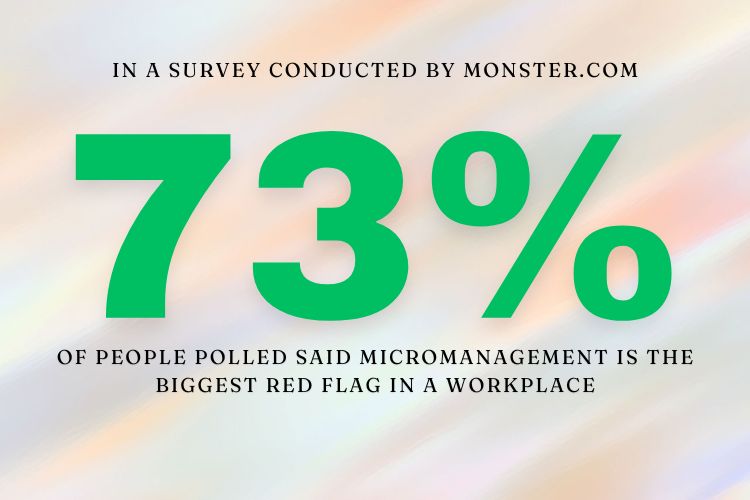Navigating the workplace can be a challenging endeavor, especially under the stewardship of a less-than-stellar manager. The difference between a good and a bad manager can profoundly affect team morale, productivity, and overall job satisfaction. It’s important to recognize the signs of inadequate management to mitigate the negative impact it can have on your career and personal well-being. In this guide, we’ll discuss 7 signs of a bad manager.
Offering insight on how to identify poor leadership and strategies for coping with it effectively. Whether you’re an employee trying to survive under poor management or an aspiring leader aiming to avoid these pitfalls, understanding these signs will empower you to make the best of your professional environment.
Jump To Section
What are the 7 Signs of a Bad Manager?

1. They Take Credit for Your Work
A bad manager often fails to acknowledge the contributions of their team. They may present your ideas and work as their own without giving you proper credit. This can be incredibly demoralizing for employees who put effort into their work.
When a manager takes credit for your work, it sends the message that they don’t value you. It may leave you feeling unappreciated and make you question if your hard work is worthwhile. A good manager uplifts their team and ensures everyone gets recognition for their unique contributions.
Some warning signs your manager is taking undue credit include rarely complimenting your work directly or mentioning you by name when presenting to upper management. You may notice your great ideas later being touted by your manager as their own inventions. Pay attention to whether your manager says “my team” or uses “I” when discussing projects you spearheaded.
A manager constantly taking credit damages team morale, unity, and work ethic. Employees become resentful and lose motivation when their work is misattributed. It leads to bitterness that a bad manager selfishly advances by downplaying others’ efforts. Your manager’s role is to enable you to do your best work, not hog the glory.
2. They Gossip and Speak Negatively About Employees
A bad manager gossips and speaks negatively about employees behind their backs. This damaging behavior hurts team morale and destroys trust within the team.
A manager who frequently gossips and badmouths employees to other coworkers is acting extremely unprofessional. Spreading rumors, disclosing private information, or criticizing employees when they aren’t present is toxic workplace behavior. It breeds distrust among team members and creates a negative environment.
When a manager gossips, team members start to feel paranoid, demoralized, and suspicious of each other. They hesitate to share information or collaborate, which damages productivity. The team loses cohesion as gossip and backstabbing spread. Morale steadily declines as employees lose faith in their boss and coworkers.
Gossiping managers also role model terrible leadership. As the team’s authority figure, a manager sets the tone for acceptable behavior. By gossiping themselves, they demonstrate that it’s alright to mock, belittle, and betray others behind their backs. This can normalize cruelty and pit team members against each other.
The only way to address a gossiping boss is to avoid participating in it yourself. If you hear rumors from a manager, don’t spread them further. You can also politely confront the manager directly, appeal to upper management, or find a less toxic workplace.
3. They Play Favorites

One of the clearest signs of a bad manager is favoritism in the workplace. This involves a manager giving special treatment to some employees over others. For example, the manager may overlook bad behavior from their favorites or give them easier assignments. At the same time, they hold other employees to much higher standards.
Favoritism inevitably causes resentment between team members. Employees who aren’t the manager’s favorites may feel it’s unfair or even discriminatory. After all, they’re doing the same work but not receiving the same rewards or leniency. This breeds resentment, frustration, and low morale across the team.
A good manager treats all employees equally and evaluates them by the same standards. They don’t have pets who get special treatment for no good reason. While managers may develop closer connections with some team members, this can’t translate into true favoritism.
Playing favorites erodes team cohesion. Soon employees stop seeing themselves as part of one team with shared goals. Instead, they feel divided into groups based on who the manager prefers. This makes it much harder to work together productively.
In the end, favoritism stems from poor leadership. A manager allows their personal feelings to override fair treatment and good judgment. All employees deserve respect and equal opportunities to advance based on merit. When a manager fails to provide this, they damage team unity, morale, and performance.
4. They Micromanage Constantly

Micromanagement is one of the most common signs of a bad manager. Micromanagers give employees little autonomy or trust in their work, resulting in excessive oversight and constant check-ins. This type of micro-management tends to stifle productivity, innovation, and morale.
Employees feel like they can’t do anything without their manager’s approval. The manager wants to control every detail and make all decisions, even minor ones. They may frequently look over employees’ shoulders to monitor their work and give excessive feedback.
Micromanagers often schedule excessive meetings and check-ins, wanting hour-by-hour updates on tasks. This level of oversight wastes employees’ time and prevents them from getting into a flow with their work. It can make employees feel incompetent, even if they are highly capable.
In addition, micromanagement stops employees from taking initiative or thinking creatively. When they have to run every minor decision by their manager, they won’t feel empowered to innovate or improve processes. Their creativity and problem-solving skills aren’t nurtured.
Micromanagers often think their close oversight results in higher-quality work. In reality, it leads to the opposite – lower morale, less creativity, and reduced productivity. Employees need autonomy and trust to thrive. Micromanagers fail to bring out the best in their teams.
5. They Are Inconsistent
A bad manager often fails to set clear expectations and constantly changes goals and priorities. This inconsistency leads to confusion and frustration among employees.
With no consistent standards or accountability, employees never know what to expect from their manager. One day a project is top priority, the next day the manager wants the team to drop everything and switch gears. A good manager provides stability, but an inconsistent manager disrupts workflow and causes missed deadlines.
When a manager frequently changes course or moves the goalposts, it becomes difficult for employees to do their best work. They may work hard to complete a task, only to have the manager decide it’s no longer important. This wastes time and effort.
Inconsistency also enables favoritism and prevents fair evaluation. With no steady criteria for performance reviews, the manager can arbitrarily praise some employees and criticize others.
An inconsistent manager stresses out employees and makes them feel insecure. They have to constantly readjust to new expectations. Morale sinks when employees feel they can’t succeed because the manager keeps changing what “success” means.
To thrive, teams need stability and clarity from their leader. An inconsistent manager who fails to set clear expectations and standards harms productivity, causes frustration, and leads to high turnover.
6. They Refuse to Address Conflicts

Many bad managers avoid difficult conversations and problems rather than dealing with them head-on. They may ignore conflict between team members, issues with performance, or complaints from employees. Allowing these issues to fester damages team dynamics, morale, and performance.
Unresolved conflicts can cause unnecessary stress, passive-aggressiveness, and hostility among team members. This toxic environment makes it difficult for employees to collaborate and lowers productivity. A good manager steps in to facilitate mediation, so employees can resolve disputes in a healthy manner.
Sweeping issues under the rug also enables poor performance to continue unchecked. Without constructive feedback, underperforming employees won’t have the opportunity to improve. On the flip side, failing to address complaints from staff prevents the manager from identifying problems in the workplace. Managers should create open channels for giving and receiving feedback to foster growth.
Overall, managers who avoid addressing problems miss the chance to strengthen team relationships, improve performance, and create a better work culture. While difficult conversations can be uncomfortable in the moment, facing issues head-on prevents further damage. Effective leaders know resolving conflicts quickly leads to a more cohesive and productive team.
7. They Don’t Accept Feedback
A good manager welcomes feedback from their team and sees it as an opportunity to improve. However, a bad manager is unable or unwilling to accept feedback, especially if it’s constructive criticism.
Signs that your manager rejects feedback include:
- Shutting down or getting defensive when given suggestions. A bad manager may take constructive feedback personally rather than professionally.
- Ignoring feedback and continuing with the status quo. They are unwilling to hear different perspectives or adapt their management style.
- Punishing employees for being honest. Some toxic managers retaliate against anyone who speaks up.
- Claiming feedback isn’t valid. They might say “no one else has had this problem” as a way to reject criticism.
- Not creating systems for feedback. Many bad managers don’t do regular check-ins or anonymous surveys to solicit input.
- Failing to acknowledge mistakes. Even when flaws are pointed out, a bad boss doubles down rather than trying to improve.
The inability to accept feedback can severely limit a manager’s growth. It also makes employees feel like their voices aren’t heard and their needs aren’t valued. This quickly erodes team morale and trust.
Now What? How to Handle a Bad Manager

Navigating a challenging workplace environment under a poor supervisor can be confusing and stressful. If you’ve recognized the signs of a bad manager and find yourself grappling with the situation, don’t despair. Here are strategies to ensure your professional and personal growth remains unhampered.
Communicate issues professionally
Begin by setting up a one-on-one meeting with your manager to have an open and professional discussion. Leverage “I” statements to explain how their actions impact your morale and productivity, focusing on constructive solutions. The intent should be to collaborate and improve the work environment.
Involve HR if necessary
In situations where direct conversations prove ineffective, don’t hesitate to bring HR into the picture. Discuss your concerns objectively and provide evidence, if any. HR can act as a mediator, facilitating conversations and ensuring adherence to company policies.
Considering new opportunities
If the management situation continues to worsen despite your best efforts, it might be time to consider seeking opportunities elsewhere. Remember, poor managers often lead to attrition. A different job might provide a more conducive culture, effective leadership, and growth opportunities.
Vent carefully and rally support
Confide in trustworthy colleagues who can empathize and understand your situation. Probe if others have undergone similar experiences and would be willing to voice their concerns. Strength often lies in unity.
Manage up respectfully
While you work through your issues, maintain a professional attitude. At all times, shun gossiping or public complaints. Strive to be a model employee, which helps in preserving your reputation.
Understandably, dealing with poor management can be daunting. However, patience, strategic communication, and professional behavior can significantly improve the situation. Always remember, your well-being and career trajectory should never be compromised. It might prove beneficial to move on if toxicity persists. You deserve a leadership that appreciates and nurtures your potential.


